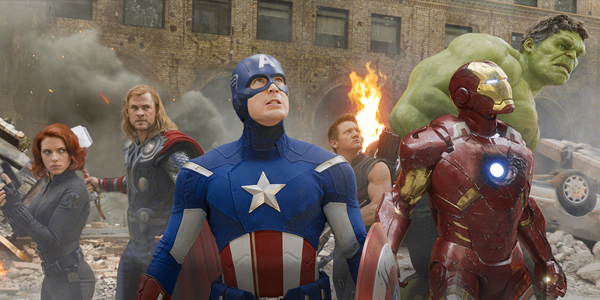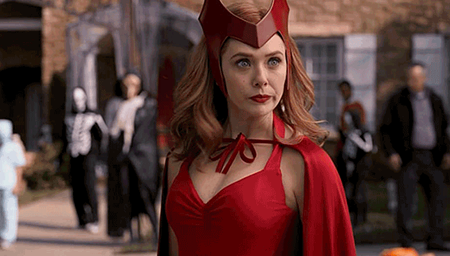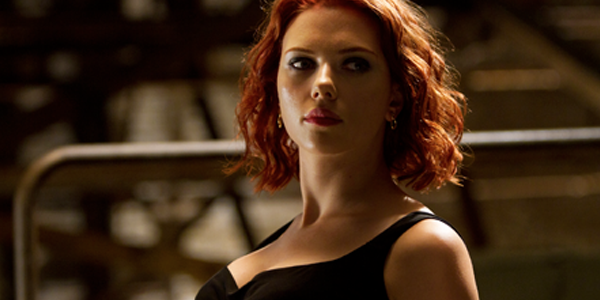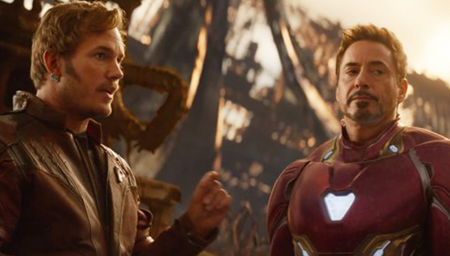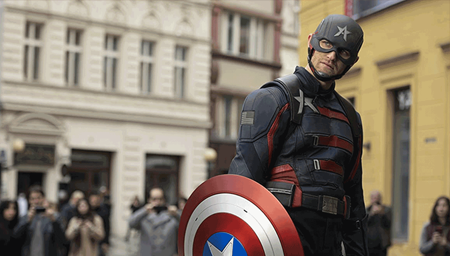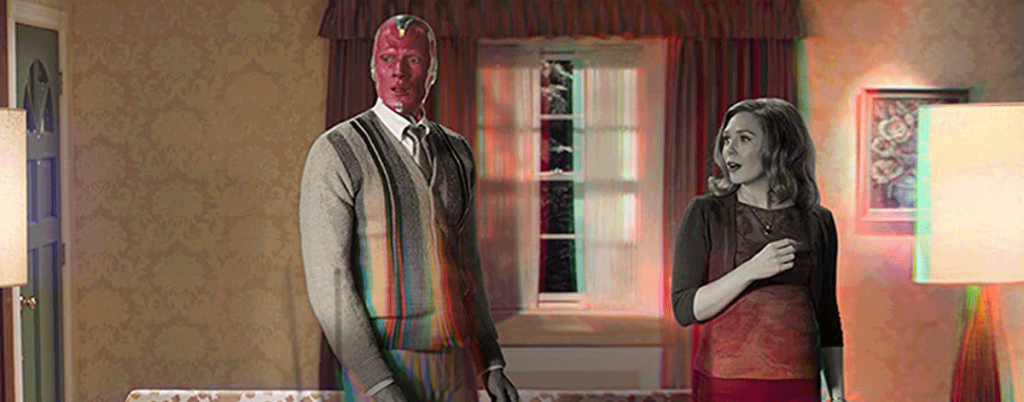
review | WandaVision
Marvel takes its fans to places they’ve never been before with this surrealist send-up of classic TV shows
by Dennis Burger
January 18, 2021
Since the 2014 release of Captain America: Winter Soldier, Marvel Studios has built up a stockpile of trust with superhero-movie fans by pretty consistently cranking out entertaining action romps that span the genre spectrum from intense ’70s-style espionage thrillers to intergalactic comedies to dramatic epics. With WandaVision, the studio is spending that trust on an offbeat experiment that will, in retrospect, be seen as either a massive success or an embarrassing failure. And two episodes into its nine-episode run, it’s nearly impossible to tell which of those outcomes is more likely.
The Disney+ limited series represents a few firsts for Marvel. It’s their first episodic short-form production (earlier, tenuously connected TV shows like the pointless Agents of S.H.I.E.L.D. were produced by Marvel Television, a separate subsidiary studio). It’s their first foray into the so-called Phase Four of the Marvel Cinematic Universe and reportedly serves as the first in a trilogy of connected stories that will continue in Jon Watts’ upcoming Spider-Man sequel and conclude with Sam Raimi’s Doctor Strange in the Multiverse of Madness. It’s also the first MCU product of any sort released since 2019’s Spider-Man: Far From Home.
But perhaps most importantly, it’s the first time Marvel has placed anywhere near this much trust in the intelligence and patience of its audience. And I say that because anyone who tells you they fully understand what’s going on here either has insider information or they’re lying their asses off.
WandaVision is, in one sense, a portrayal of the supposedly idyllic home life of Wanda Maximoff and the Vision, two star-crossed lovers whose first big-screen appearance was in the otherwise forgettable Avengers: Age of Ultron (one of the studio’s few truly bad movies post-Winter Soldier). The problem, of course, is that we saw the Vision die an awful death in 2018’s Avengers: Infinity War—first at the hands of Wanda herself then through some temporal trickery at the hands of Phase Three’s big bad, Thanos.
So the fact that he’s seemingly alive and mostly well in WandaVision is our first clue something is amiss here. But it’s far from the last and hardly the biggest. A much more blatant clue that not all is as it seems is that the series is produced in the style of classic sitcoms, starting with a pitch-perfect homage to The Dick Van Dyke Show (Van Dyke himself was a consultant and influenced a number of creative decisions, including the choice to shoot with vintage lenses and lighting and to produce the first episode in front of a live studio audience), then bleeding into time-capsule recreations of Bewitched and I Dream of Jeannie and—if the series’ trailer is any indication—advancing forward in time as the story unfolds, paying loving homage to newer and newer half-hour TV shows until . . .
Well, that’s the question, isn’t it? Where is this all going? What’s the point of all this classic-TV homage?
Fans of the comics that inspired the series—most notably the fantastic The Vision and the Scarlet Witch mini-series from the ’80s, the heartbreaking House of M from the early aughts, and the brilliant-but-batshit-insane Vision standalone series from 2015-2016—certainly have a clue as to what’s going on here. Or at least we think we do.
From my perspective, it seems obvious that WandaVision is a story about what happens when someone with the ability to manipulate the very fabric of reality becomes so stricken with grief that she forms a new reality around her. And there are clues sprinkled throughout the first two episodes that this is what’s going on. Wanda, unable to process the horror of losing her one true love—indeed, of being forced to kill him herself—has snapped. Unable to cope with the real world, she creates her own world to occupy, a world whose picket fences and goofball antics are all informed by the classic sitcoms she saw in her youth. It’s important to remember that Wanda grew up in war-torn Eastern Europe and as such never had the idyllic suburban life she’s attempting to fabricate. So any sort of normal life is, for her, purely fantasy.
So it makes sense that when reality begins to intrude upon that fantasy, she rejects it, once again reforming the world around her into something she can once again cope with. We see this at one point when she simply exclaims, “No!” and literally rewinds the tape on her sitcom life, only to reshape it into something a little more colorful and a little more congruous with her unexpected pregnancy.
It all sounds a little trite, but series creator/writer Jac Schaeffer and Episode 1 and 2 director Matt Shakman so fully and sincerely commit to the classic Dick Van Dyke Show/Bewitched/I Dream of Jeannie tone, style, presentation, and aesthetic for so much of the running time—without a hint of spoof or parody—that you can’t help but be drawn into it. When the series ventures more toward Twilight Zone territory, as it does when Wanda’s grasp on her faux reality begins to slip, it’s as disconcerting for the viewer as it is for the characters.
Of course, that’s simply my take after two episodes. It’s entirely possible that MCU mastermind Kevin Feige has constructed a trap for us comic-book fans, leading us astray with red herrings before yanking the rug out from under our collective feet, leaving us exactly as disoriented as I would imagine most casual viewers are after having sat through the first two episodes of this weird experiment. Maybe this isn’t all Wanda’s delusion. Maybe she isn’t shaping reality around her. Maybe it’s—who knows?—aliens tinkering with her brain. Or maybe it’s a Truman Show sort of thing.
All I can say for sure is that, two episodes in, I’m utterly intrigued by WandaVision and can’t wait for it all to unfold. My first inclination was to think that perhaps Disney+ should have broken with tradition and dumped all nine episodes into our laps at once. The more I think about, though, the more I realize the weeklong break between episodes is an absolute necessity, giving me time to re-watch, ponder, reflect, and discuss what’s happened thus far before diving into the next chapter in this slow-burn psychological mystery.
Again, by the time all nine episodes are available, it could all end up being one big exercise in pseudo-intellectual gobbledygook, à la Tenet, or it could be one of the most brilliant TV series to come along in years, and the wait to find out which it is consumes me like an itch I just can’t quite reach. But for now, I find myself in a Schrödinger’s Cat superposition of fascination and skepticism. It’s difficult to imagine any corporate machine pulling off an act of truly artistic surrealism of the sort WandaVision seems to be. But at the same time, I have to acknowledge that they’re pulling it off so far.
And that’s largely due to not only the success of the aesthetic and stylistic conceit but also the delightful performances across the board. You could easily splice stars Elizabeth Olsen and Paul Bettany into old footage of classic TV shows and anyone who didn’t know the actors already wouldn’t bat an eyelash. Kathryn Hahn is also an absolute tour de force in the role of Agnes, the nosy next-door neighbor who definitely has a major part to play in this mystery. (Indeed, most comic-book fans will have likely figured out who she is by the end of the second episode, but I won’t spoil that surprise.)
But world-class acting alone isn’t enough to sustain a series that’s attempting to take as big a bite as this one is. So, more than anything, I hope WandaVision doesn’t end up choking. Because if the MCU is to remain interesting, it absolutely must keep taking artistic risks like this.
Dennis Burger is an avid Star Wars scholar, Tolkien fanatic, and Corvette enthusiast who somehow also manages to find time for technological passions including high-end audio, home automation, and video gaming. He lives in the armpit of Alabama with his wife Bethany and their four-legged child Bruno, a 75-pound American Staffordshire Terrier who thinks he’s a Pomeranian.
© 2025 Cineluxe LLC


